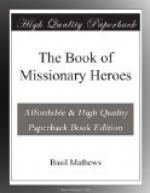Suddenly smoke could be seen, and then a hamlet of thirty houses loomed up. Forder opened a door and a voice came calling, “Welcome!” He went in and saw some Arabs crouching there out of the rain. A fire of dried manure was made; the smoke made Forder’s eyes smart and the tears run down his cheeks. He changed into another man’s clothes, and hung his own up in the smoke to dry.
“Where are we?” he asked. The men told him that he was about two and a half hours’ ride from the castle and two hours off the track that he had left in the mist. The men came in from the other little houses to see the stranger and sip coffee. Forder again brought out an Arabic New Testament and found to his surprise that some of the men could read quite well and were very keen on his books. So they bought some of the Bibles from him. They had no money but paid him in dried figs, flour and eggs. At last they left him to curl up on the hard floor; and in spite of the cold and draughts and the many fleas he soon fell asleep.
As dawn came up he rose and started off: there (as he climbed out of the hollow in which the hamlet lay) he could see the Castle Sulkhund. He knew that the Turks did not want any foreigner to enter that land of the Arabs, and that if he were seen, he would certainly be ordered back. Yet he could not hide, for the path ran close under the castle, and on the wall strode the sentry. The plain was open; there was no way by which he could creep past.
At last he came to the hill on which the castle stood. At that very moment a dense mist came down; he walked along, lost the track, and found it again. Then there came a challenge from the sentry. He could not see the sentry or the sentry him. So he called back in Arabic that he was a friend, and so passed on in the mist. At last he was out on the open ground beyond both the castle and the little town by it. Five minutes later the mist blew away; the sun shone; the castle was passed, and the open plains lay before him. The mist had saved him.
In an hour he came to a large town named Orman on the edge of the desert sandy plains; and here he stayed for some weeks. His horses were sent back to Jerusalem. Instead of towns and villages of huts, he would now find only the tents of wandering Arabs who had to keep moving to find bits of sparse growth for their few sheep and camels. While he was at Orman he managed to make friends with many of the Arabs and with their Chief. He asked the Chief to help him on toward Kaf—an oasis town across the desert.
“Don’t go,” the Chief and his people said, “the Arabs there are bad: when we go we never let our rifles out of our hands.”
So the old Chief told him of the dangers of the desert; death from thirst or from the fiery Arabs of Kaf.
“I am trusting God to protect and keep me,” said Forder. “I believe He will do so.”
So Forder handed the Chief most of his money to take care of, and sewed up the rest into the waistband of his trousers. (It is as safe as a bank to hand your money to an Arab chief who has entertained you in his tent. If you have “eaten his salt” he will not betray or rob you. Absolute loyalty to your guest is the unwritten law that no true Arab ever breaks.)




